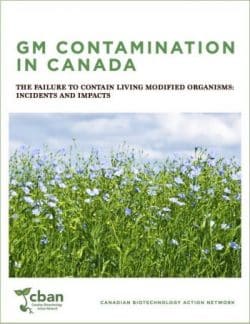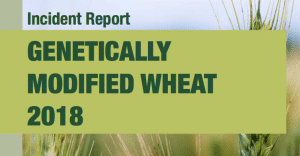Wheat
Market Status
The first-ever genetically modified (GM or genetically engineered) wheat has now been approved for eating and growing in Argentina, and it is also approved for eating in the United States, and many other countries but not yet in Canada. (The Canadian government lists herbicide-tolerant wheat varieties as approved “Plants with Novel Traits” but these are not the product of genetic engineering, those wheat varieties were created using chemically induced seed mutagenesis).
CBAN Factsheet: GM Wheat Update, October 2024
Updates
August 2025: The Chilean startup Neocrop Technologies, in collaboration with national seed company Campex Baer and Argentina’s Buck Semillas, has permission to release a gene-edited wheat variety with a claim to “five to ten times higher dietary fiber content than conventional flour wheat, while maintaining the taste, texture, and quality of white flour” The gene-edited wheat does not require government safety assessments in Chile. It is not ready for immediate market release, with planned field trials for 2025/2026.Chile does not grow any GM crops, but replicates GM seed for export.
December 2024: The US Department of Agriculture reports that: “There is no commercial production of GE wheat in Canada. Industry contacts state that one of the largest barriers to market is the low yield outcomes in trials, relative to non-GE wheat, in addition to lack of acceptance in some foreign markets.“
October 2024 – CBAN Factsheet: GM Wheat Update
- Canadian government researchers are field testing a gene-edited wheat that is exempt from government GMO regulation.
- The world’s first genetically modified wheat is now being grown in Argentina.
January 2024: A food sovereignty alliance from Latin America, Africa, and Asia asked seven UN Special Rapporteurs for urgent intervention to block cultivation and trade of GM wheat HB4. CBAN endorsed the request – Click here to read the full request.
December 2023: GRAIN reports the pressure on Bolivia to import GM wheat. Bolivia: yet another testing ground for GMOs? December 14, 2023
June 2023: Paraguay approves cultivation of GM wheat HB4. Article: July 28, 2023: “Bread without poison”, the campaign that rejects transgenic wheat in Paraguay’
CBAN Factsheet: GM Wheat Update, April 2023
- In 2023, Indonesia, which is the second-largest importer of Argentinian wheat, approved importation for food and animal feed.
- In 2022, it was approved for import to Nigeria, and to Australia and New Zealand. The United States Food and Drug Administration FDA also concluded that the GM wheat is safe for consumption but it is not yet approved for planting in the US.
- In November 2021, Brazil approved the importation of flour from the GM wheat, and in 2023 Brazil approved it for growing.
- In October 2020, Argentina approved a genetically engineered herbicide-tolerant and drought-resistant wheat from the biotechnology company Bioceres. This makes Argentina the first country in the world to approve a GM wheat.
Article: GMO wheat in Argentina suffers from low yields, GMWatch UK, February 1, 2022
“The markets are still closed to GM wheat, regardless of the biotech industry’s endless and unfulfilled promises of “environmental” applications or agronomic miracles.” – Arnold Taylor, Chair, Organic Agriculture Protection Fund, SaskOrganic, in a letter to the editor of The Western Producer, November 5, 2020.
Take Action
You can sign the petition to the Government of Argentina, “Hands off our bread!”: Click here for the English translation and a link to sign.
GM Wheat Escape Incidents
There have been four escape incidents with unapproved GM wheat in the U.S (discovered in 2019, 2016, 2014 and 2013) and one in Canada (2018). Click her for the list of incidents.
June 2019: GM Wheat Discovered in the U.S.
In the fourth incident in the US since 2013, the U.S. Department of Agriculture has reported unapproved GM glyphoste-tolerant wheat plants growing in Washington State.
June 2018: GM Wheat Discovered in Canada
On June 14, 2018, the Canadian government announced a contamination incident with unapproved genetically modified (GM or genetically engineered) wheat. Several GM wheat plants were found on a road in Alberta in an isolated contamination case and the government does not know how they got there. No GM wheat was ever approved for growing or eating in Canada, but the GM trait found growing in Alberta was field tested from 1998-2000.
The CFIA confirmed that the Alberta wheat sample was a match for a Monsanto GM glyphosate-tolerant wheat MON71200, which was used in multiple field trials in the late 1990s and early 2000s in Canada and the US: “The physical locations of the confined research field trials were approximately 300 kilometres or more away from where the GM wheat plants were found in Alberta. Given the passage of time and large distances involved, there is no evidence that would explain how or if the current GM wheat finding is linked with a previous trial.”
In April 2022, the Canadian Grain Commission ended testing of bulk wheat shipments to all destinations.
For documentation of GMO escape and contamination incidents in Canada, see CBAN’s Report “GM Contamination in Canada: The failure to contain living modified organisms – incidents and impacts”
Resources on the 2018 escape incident:
- CBAN Background – June 27, 2018: Genetically Modified Wheat Contamination in Canada
- June 20, 2018: The National Farmers Union has called for a ban on outdoor testing of GM crops, and has asked the government to “make public the precise location of every current and past genetically modified wheat test site so that farmers and other Canadians can be on the look- out for escapes and if found, assist in eradicating them.”
- June 15, 2018 – Press Release: Unapproved genetically modified wheat found in Canada
- June 14, 2018: The Canadian Food Inspection Agency published an incident report and other documents on the “Detection of genetically modified herbicide-tolerant wheat in Alberta”
 . The CFIA says that this was “an isolated finding of a few genetically modified wheat plants on an access road in southern Alberta” and that “there is no evidence that this GM wheat is present anywhere else other than the isolated site where it was found.” The CFIA also says “We may never know how this GM wheat came to be present on an access road.” Click here to read the detection report and statements from the CFIA.
. The CFIA says that this was “an isolated finding of a few genetically modified wheat plants on an access road in southern Alberta” and that “there is no evidence that this GM wheat is present anywhere else other than the isolated site where it was found.” The CFIA also says “We may never know how this GM wheat came to be present on an access road.” Click here to read the detection report and statements from the CFIA.
Past Developments
Summary History: In 2004, Monsanto withdrew requests for government approval of its herbicide tolerant GM wheat in Canada and the US because of widespread farmer and consumer protest in both countries, and around the world. However, Monsanto (now Bayer) re-launched research into GM wheat in 2009 and the biotechnology industry engaged in a new public relations campaign to create a climate favorable to the introduction of GM wheat. In the meantime, there have been five escape incidents with illegal, unapproved GM wheat plants in North America. In 2010, the Canadian Biotechnology Action Network coordinated a global effort that resulted in 233 groups from 26 countries restating their opposition to GM wheat.
February 2012: Canadian farmers spoke in communities across Australia. Australians want to know why Canadian farmers, processors and citizens, worked so hard to keep out GM wheat. “As a young farmer, only recently returned to the farm, I have no desire to grow GE wheat, nor do I want my neighbors to grow it. Pollen flow, spillage and the many points where contamination can take place would make it impossible for me to grow GE free wheat. On every level it is a bad idea.” stated Matt Gehl, 27, who farms over 1600 hectares in Canada.
February 2012: “Genetically modified (GM) wheat … is still widely regarded as not acceptable for the foreseeable future.” stated the Grain Growers Ltd, leading industry body for the Australian grains industry. From the February 2012 report titled “What the World Wants from Australian Wheat” – an analysis of industry surveys and interviews with flour and stock feed manufacturers in Australia, South East Asia, North Asia, the Middle East and Europe. Over 80% of Australia’s export market (in value) will not buy GM wheat now, for the next five years, or in the foreseeable future.
April 7, 2011: Canada’s National Research Council Disavows GM Wheat. The National Research Council of Canada (NRC) issued a statement to clarify that it has no plans to research genetically modified (GM) wheat. NRC now states: “GM wheat is not an objective of the NRC wheat program. We will be developing a number of tools that will be used to reduce the breeding cycle, increase yield and adapt to climate stresses. GM varieties are not contemplated at this time.” The statement was issued to CBAN in response to media stories of April 3 that reported on a leaked memo from the government research agency. “NRC has finally recognized what everyone but Monsanto understands: that GM wheat is unacceptable to farmers and consumers,” said Lucy Sharratt of the Canadian Biotechnology Action Network.
- Read the full press release: “Canada’s National Research Council Disavows GM Wheat”
- Read the full statement from the National Research Council
July 2011: Australia’s top scientific body, CSIRO, is conducting the world’s first human feeding trials of GM wheat. Scientists have already denounced the trials: “The feeding trials should not be conducted until long-term impact assessments have been undertaken and appropriate information released to enable the scientific community to determine the value of such research, as against the risks.” A Greenpeace report, Australia’s Wheat Scandal, detailed a major conflict of interest at CSIRO.
July 2010: Monsanto and BASF Plant Science are expanding joint research to develop GM wheat. They say they aim to commercialize a GM wheat in at least 10 years. The companies say they plan to “initially focus on developing biotech products for the North American and Australian markets.” The joint announcement comes on the heels of a separate plan announced by Syngenta and the International Maize and Wheat Improvement Center in April to work toward biotech wheat
Farmer Rejection in Canada
- 69% of farmers are opposed to the introduction of GM wheat “at this time” according to a 2009 survey conducted by the Canadian Wheat Board.
- 83% of Canadian farmers disagreed that Roundup Ready wheat should be introduced according to a study started in 2004 and published in a peer reviewed article March 2009. Overall, the farmers ranked the risks of market loss, corporate control of the food supply, agronomic impact and contamination of non-GM crops much higher than any anticipated production benefits. The study: “Farmer knowledge and a priori risk analysis: pre-release evaluation of genetically modified Roundup Ready wheat across the Canadian prairies”, Ian J. Mauro & Stéphane M. McLachlan & Rene C. Van Acker, 20 March 2009, Environmental Science and Pollution Research.
GM Wheat Rejected Globally
233 Farmer and Consumer Groups from 26 Countries
A rejection statement was organized by CBAN in response to a 2009 pledge from industry groups in Canada, Australia and the US to “work toward the goal of synchronized commercialization of biotech traits in our wheat crops.” The statement reads:
“In light of our existing experience with genetic engineering, and recognizing the global consumer rejection of genetically engineered wheat, we restate our definitive opposition to GE wheat and our commitment to stopping the commercialization of GE traits in our wheat crops”
- List of groups who signed the definitive rejection statement and here is the full letter statement
- Press Release, February 2010
- Contact us to sign on
- 15 groups from Canada, Australia and the USA initiated the statement
Slovak Translation! Definitívne Globálny odmietnutie geneticky modifikované pšenica





